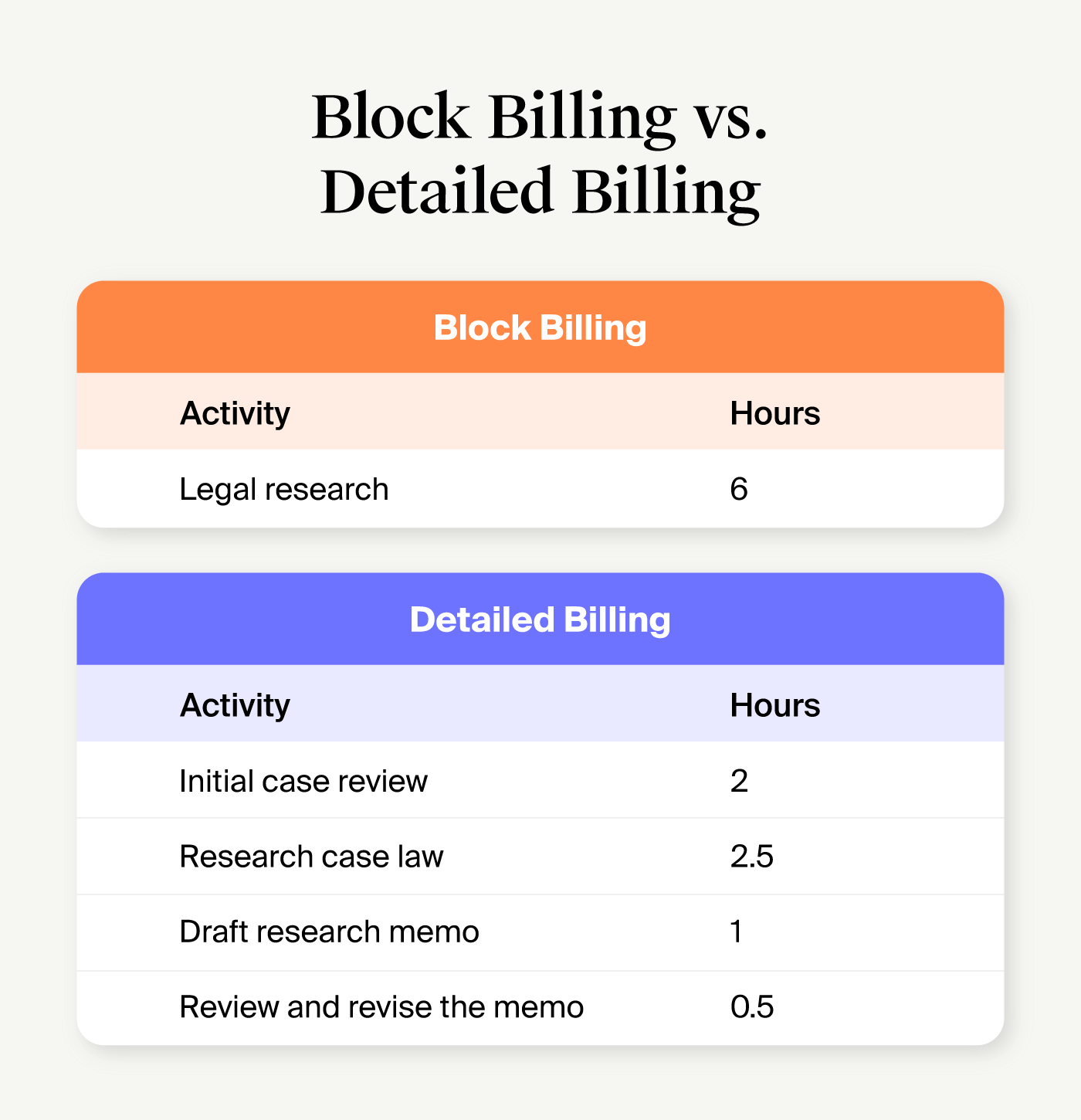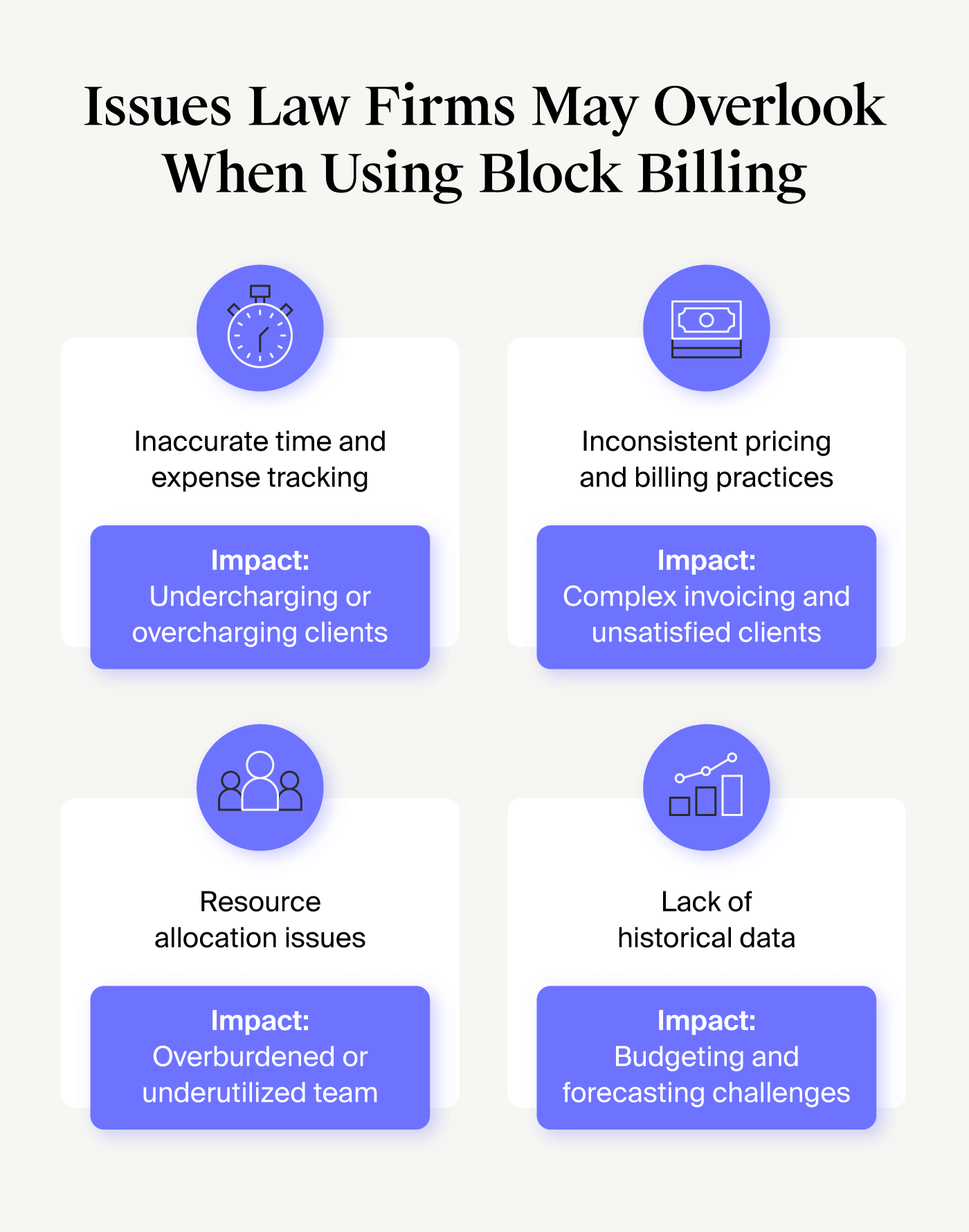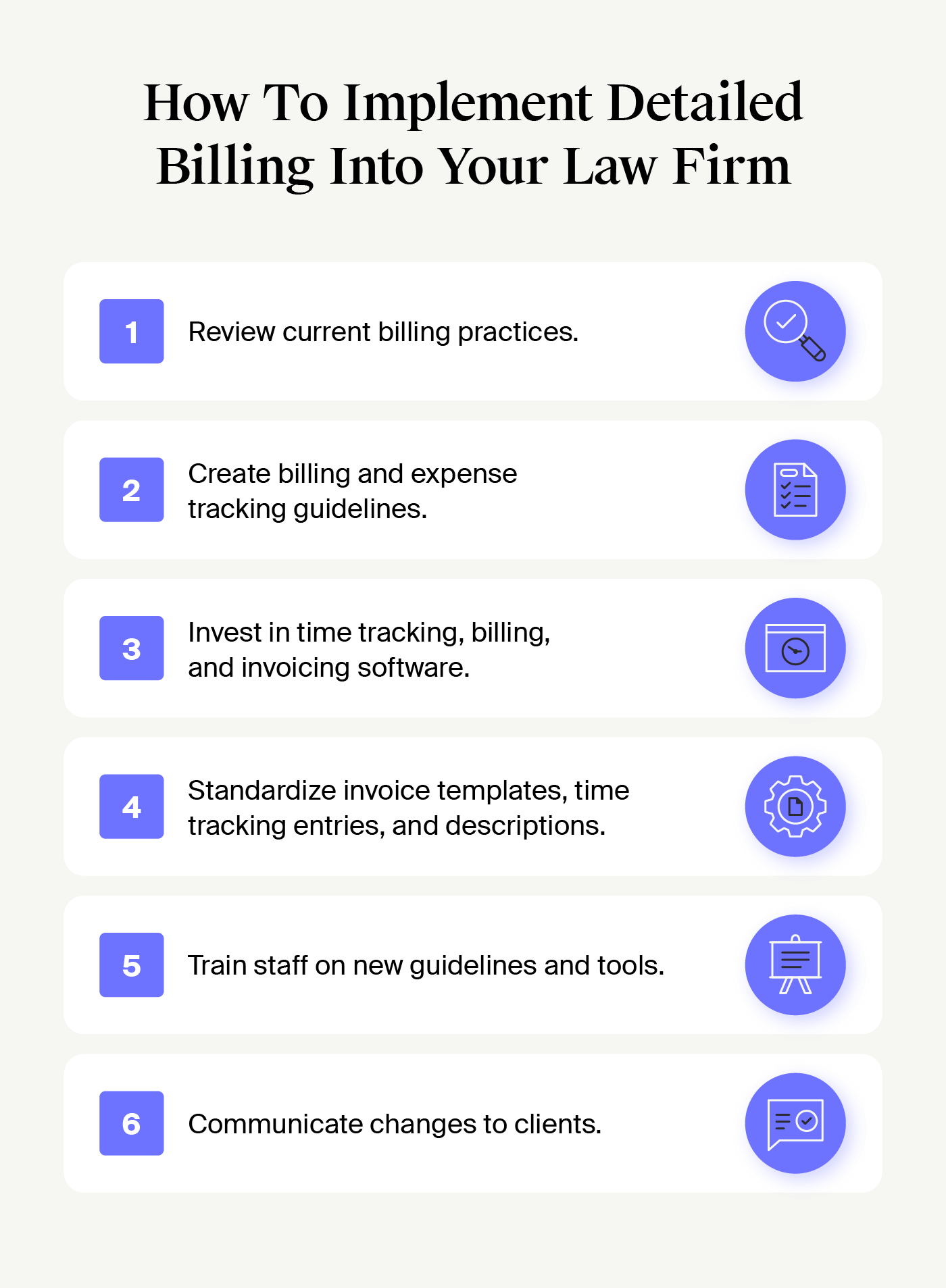Key takeaway
Block billing is a billing practice where attorneys group multiple tasks into a single time entry instead of separately detailing each task. It can lead to confusion and client disputes over charges, as it lacks the transparency that detailed billing provides.
As a busy attorney, maximizing your billable hours is crucial to accelerating cash flow and running a profitable law practice. However, block billing—lumping together multiple tasks into a single time entry—can make it difficult to track how your time is truly spent. Not only can this lead to disputes with clients, but it also reduces transparency, which can raise questions about the accuracy of your invoices.
With increasing pressure from clients, regulatory bodies, and court directives on providing clear and precise billing, more attorneys are turning to legal billing software to streamline their processes. These tools help ensure that you bill each task accurately, eliminating the guesswork and improving client trust.
In this overview, you’ll learn why block billing should be avoided and how to bill clients more efficiently without sacrificing your valuable time.
What Is Block Billing?
Block billing is a legal billing practice in which multiple tasks are grouped together under a single time entry instead of itemizing each task individually. For example, instead of listing separate times for reviewing case law, drafting a motion, and attending a client deposition, they are all combined into one block of hours.
While it may seem convenient, this method often lacks transparency and can confuse clients reviewing their invoices. Clients prefer clarity when it comes to billing, and lumping tasks together can raise red flags—leading to disputes or requests for more detailed explanations.
Block Billing Example
Let’s say you worked on a client’s case for four hours and logged it as “Legal Research: 4 hours.” This is a classic example of block billing. While it captures the total time spent, it doesn’t clarify how much time you spent on microtasks.
The client may wonder whether the motion drafting took longer than expected or if the deposition preparation was as efficient as possible, leading to potential billing disputes.
Instead of saying it took six hours for legal research, use a more detailed billing approach to break these tasks down individually:
Initial case review: 2 hours
Research case law: 2.5 hours
Draft research memo: 1 hour
Review and revise the memo: 0.5 hour

This itemized format leaves no room for confusion, providing transparency and justifying the time spent on each task. By presenting a clear and detailed attorney billing statement, you build client trust and make it easier for them to understand—and promptly pay—the invoice.
Why Lawyers Shouldn’t Use Block Billing
While block billing may seem like a time-saver, its lack of transparency can lead to significant issues like lost revenue, client confusion, and potential ethical concerns. Understanding these pitfalls is key to avoiding dissatisfaction and disputes.
Revenue Leakage
One of the most pressing issues with block billing is revenue leakage. When you group tasks into a single entry, you may inadvertently underreport the time spent on specific activities, leading to unclaimed billable hours. This can create cash flow problems, as firms miss out on potential income that could have been captured through more precise billing methods.
By implementing detailed billing practices, you can ensure you account for all billable hours and maintain healthy cash flow.
Client Disputes
Block billing can also lead to client disputes due to its inherent lack of clarity. When clients receive an attorney billing statement that combines multiple tasks into one line item, they may find it challenging to understand what they are being charged for. This confusion can prompt questions about the legitimacy of the charges and raise ethical concerns. It can also damage the attorney-client relationship and result in delayed payments or even loss of clients.
Compliance Violations
Beyond client trust issues, block billing can also lead to compliance violations, particularly regarding Interest on Lawyer Trust Accounts (IOLTAs). Attorneys must adhere to strict guidelines to maintain their compliance with local regulations. Failing to itemize billable hours may result in mismanagement of client funds and potential legal ramifications.
Violations of IOLTA rules or trust account regulations can lead to serious consequences, including fines or even disbarment. These risks highlight the importance of using detailed billing to comply with ethical standards and ensure transparency. Lawyers should be well-versed in the rules governing trust accounting and IOLTA accounts to avoid issues.
Issues With Pricing and Expense Tracking
Block billing may also highlight underlying issues with pricing and expense tracking. When attorneys struggle to determine how much to charge clients or lack a standardized billable hours chart, they may resort to block billing as a workaround.
This practice can prevent firms from accurately assessing their pricing models, leading to client billing and revenue inconsistencies. For example, suppose a lawyer consistently uses block billing for tasks like court appearances, document drafting, and client consultations. In that case, they may undercharge for time-intensive work while overcharging for simpler tasks.
Establishing clear pricing guidelines for attorney fees and case costs and tracking expenses diligently can help you avoid the pitfalls of block billing and ensure you are compensated fairly for your work.

5 Tips To Address Common Challenges With Detailed Billing
While transitioning to a more detailed billing approach offers numerous benefits, it can also introduce new challenges. For instance, you need meticulous attention to detail to itemize billable hours, and even then, it can lead to concerns about efficiency and time management.
Also, attorneys may worry about the extra effort required to track each task, fearing it could hinder their productivity and increase administrative overhead. The following tips address these concerns head-on.

1. Establish a Standardized Billing Process
You need a standardized billing process to streamline legal billing and eliminate inefficiencies. Here are a few things that can help:
Develop clear guidelines to ensure that every attorney understands the expectations for recording their time and submitting invoices.
Use an attorney billable hours chart to improve time tracking efficiency by offering a straightforward approach to capture your billable hours.
Provide legal invoice templates to make the invoicing process more efficient and reduce the likelihood of errors or misunderstandings.
These standardized tools not only save time but also enhance clarity for clients. Receiving invoices that follow a uniform structure and include detailed descriptions of services rendered fosters transparency and trust.
2. Consider Other Billing Methods
By considering alternative billing for lawyers, firms can create more predictable and transparent pricing structures that resonate better with clients. This approach not only enhances client satisfaction but can also help ensure compliance with any applicable billing regulations.
When evaluating other billing methods, consider client preferences, the complexity of the legal work, and any compliance requirements that may affect billing practices. Here are some alternative billing methods to consider:
Evergreen retainers: Ongoing payments for access to legal services over a specified period
Flat rates: Fixed fees for specific services, providing clients with cost predictability
Contingency fees: Payment contingent on the successful outcome of a case, often used in personal injury law
Capped fees: A maximum charge for services, reassuring clients that costs won’t exceed a certain limit
Unbundled services: Consists of payment for specific legal services instead of comprehensive representation
Sliding fees: Rates that are adjusted based on the client’s ability to pay, making legal services more accessible
3. Keep Detailed Records
One common challenge in maintaining detailed records (for specific billing) is the time it takes to create comprehensive descriptions for billing entries. This task can feel burdensome amidst a busy workload. Overcoming this challenge can lead to significant benefits, including:
Enhanced transparency: Clients gain a clear understanding of the services rendered, minimizing confusion and potential disputes.
Increased trust: Providing detailed explanations fosters a stronger client relationship and encourages timely payments.
Streamlined communication: Clear descriptions facilitate better communication between you and your clients regarding the legal work performed.
Consistency across invoices: Utilizing legal billing software allows attorneys to set default descriptions for common tasks, saving time and ensuring uniformity in billing entries.
Efficient updates: You can use online billing instead of traditional billing to seamlessly update and customize entries—maintaining thorough records without added hassle.
4. Use Passive Online Time Tracking Software
Attorneys often struggle with the manual input necessary for tracking billable hours. This process can lead to inaccuracies, as hours may be forgotten or overlooked—negatively affecting revenue and client trust.
You can solve this problem by using passive online time-tracking software to automate the recording of billable hours. According to our 2024 Legal Industry Trends Report, 65% of law firms use online time-tracking software. Of those firms, 47% capture 1-5 additional hours each week.
By utilizing such time management software for law firms, you can address common complaints associated with traditional time tracking, such as the potential for inaccurate billing due to forgotten or overlooked hours.
5. Automate Billing and Invoicing
Automating billing and invoicing through software can significantly enhance the overall efficiency of your firm’s financial processes. A platform like MyCase combines legal practice and business management—streamlining everything from time tracking to invoice generation.
This integration ensures that attorneys spend less time on administrative tasks and more time focusing on client work. Legal invoicing software eliminates the manual entry of billable hours and the potential for errors—allowing for faster, more accurate billing cycles.
Moreover, legal e-billing management features simplify invoicing by enabling firms to send invoices electronically, track their status, and receive payments more quickly. Automating these tasks can reduce the time spent on non-billable work, ultimately maximizing profitability and improving cash flow.
Learn how to create a hassle-free billing workflow that can create better experiences for you and your clients.

Bill More Efficiently With MyCase
Understanding the drawbacks of block billing and the importance of detailed billing practices should help you enhance your firm’s billing efficiency. By implementing strategies such as the process of keeping detailed records, automating billing processes, and utilizing passive online time-tracking software, you can improve your cash flow and foster trust and satisfaction among your clients.
Consider using our comprehensive legal billing software to make the transition to efficient legal billing even easier. Designed to simplify your billing processes and enhance your firm’s productivity, MyCase can help you manage your finances seamlessly.
Explore our legal billing software and sign up for a free trial today to start experiencing the benefits firsthand.
About the author

Esther ParkContent Writer
Esther Park is a content writer and Senior SEO Manager for leading legal software companies, including MyCase, Docketwise, and CASEpeer, as well as LawPay, the #1 legal payment processor. Her expertise lies in writing about emerging legal technologies and financial wellness strategies for law firms, among other topics.
